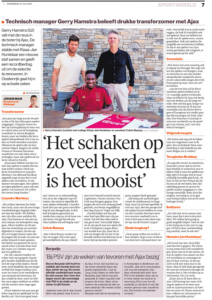On July 17th, Manchester United confirmed they had reached an agreement with Ajax for the transfer of Lisandro Martínez.
Arsenal also showed interest in the defender, but Manchester United were successful in agreeing a deal with the Eredivisie winners.
A move to Manchester United sees the centre-back reunite with Erik ten Hag. It was under the manager’s orders that the Argentina international established himself at Ajax.
Algemeen Dagblad have interviewed Ajax technical director Gerry Hamstra, and during the chat, Martínez’s exit from the club was discussed.
Hamstra admitted it was too difficult for Ajax to turn down the offer from the Red Devils, even though they wanted to keep the player. The Premier League club agreed to pay €57.37m plus an additional €10m in potential bonus payments for the player.
“We really didn’t want to lose Martínez, but with such high transfer amounts everyone understands how it works. We all have our ambitions at Ajax,” Hamstra said.
“Then six starting players can’t suddenly leave either. Only this year we had to deal with a combination of circumstances. The one-on-one replacements cost more than the guys you get to grow a year behind someone.
“The ideal [scenario] would have been if we had someone standing behind Lisandro, and Lisandro had stayed another year.”
Hamstra also revealed Ajax tried to convince the South American to stay but he had made up his mind to join Manchester United, and was insistent on taking the next step in his career.
“We had a conversation again after his vacation. In it, Lisandro clearly indicated that he still wanted to take the step. It became increasingly clear that a longer stay was no longer feasible, because we are simply not at the top of the food chain,” the director explained. 
“And then you go on as we have our own ambitions and want to aim high again this season. While everyone said a few years ago after a draw at Benfica: ‘that’s a good result’, there is now disappointment.
“So, if you want to take that next step, you actually have to keep these kind of players. Lisandro has developed a lot with us for three years, has become champion three times and now felt this step was the chance of a lifetime. He indicated that. We also understood that.”



























